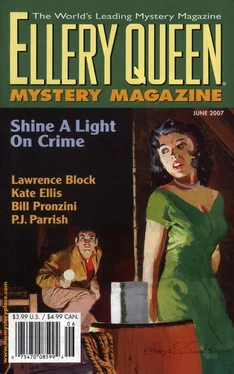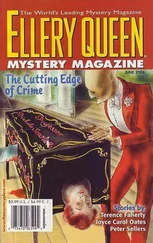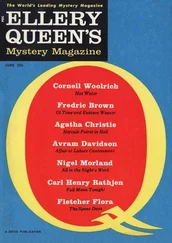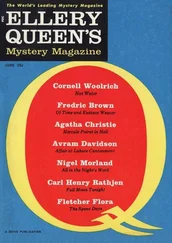Lawrence Block - Ellery Queen’s Mystery Magazine. Vol. 129, No. 6. Whole No. 790, June 2007
Здесь есть возможность читать онлайн «Lawrence Block - Ellery Queen’s Mystery Magazine. Vol. 129, No. 6. Whole No. 790, June 2007» весь текст электронной книги совершенно бесплатно (целиком полную версию без сокращений). В некоторых случаях можно слушать аудио, скачать через торрент в формате fb2 и присутствует краткое содержание. Город: New York, Год выпуска: 2007, ISBN: 2007, Издательство: Dell Magazines, Жанр: Детектив, на английском языке. Описание произведения, (предисловие) а так же отзывы посетителей доступны на портале библиотеки ЛибКат.
- Название:Ellery Queen’s Mystery Magazine. Vol. 129, No. 6. Whole No. 790, June 2007
- Автор:
- Издательство:Dell Magazines
- Жанр:
- Год:2007
- Город:New York
- ISBN:ISSN 0013-6328
- Рейтинг книги:5 / 5. Голосов: 1
-
Избранное:Добавить в избранное
- Отзывы:
-
Ваша оценка:
- 100
- 1
- 2
- 3
- 4
- 5
Ellery Queen’s Mystery Magazine. Vol. 129, No. 6. Whole No. 790, June 2007: краткое содержание, описание и аннотация
Предлагаем к чтению аннотацию, описание, краткое содержание или предисловие (зависит от того, что написал сам автор книги «Ellery Queen’s Mystery Magazine. Vol. 129, No. 6. Whole No. 790, June 2007»). Если вы не нашли необходимую информацию о книге — напишите в комментариях, мы постараемся отыскать её.
Ellery Queen’s Mystery Magazine. Vol. 129, No. 6. Whole No. 790, June 2007 — читать онлайн бесплатно полную книгу (весь текст) целиком
Ниже представлен текст книги, разбитый по страницам. Система сохранения места последней прочитанной страницы, позволяет с удобством читать онлайн бесплатно книгу «Ellery Queen’s Mystery Magazine. Vol. 129, No. 6. Whole No. 790, June 2007», без необходимости каждый раз заново искать на чём Вы остановились. Поставьте закладку, и сможете в любой момент перейти на страницу, на которой закончили чтение.
Интервал:
Закладка:
“Your food has gotten cold,” he said finally, when she failed to look at him.
“I’m not hungry,” she replied. “I don’t feel well.”
“Is it your... Is it the ‘internal complaint’ again?” he asked, and the phrase became bitter in his mouth, tainting the sweet aftertaste of his meal.
Anna Sergeyevna gave a slow nod.
“You know,” he continued, his voice even, unperturbed, “we have very good doctors here as well. That is part of my responsibility, the responsibility of my committee on the zemstvo, to ensure the presence of excellent doctors here. Perhaps they are not as plentiful as they are in Moscow, but they are well trained and eager to help.” They had traveled this path before — as many times now as the number of trips she had made to Moscow — and both of them knew the way. “I am happy to arrange an appointment for you.”
“Zhenya,” she said, his nickname a plaintive sigh, and Evgeniy at once resented her pleading, pitying tone. But before he could speak, one of the servants came in to clear more plates. The couple remained silent while the young scullion tidied the table, and after the girl left, Anna Sergeyevna once more assumed a firmer tone. “I have already made an appointment in Moscow,” she said, “with the doctor I have consulted there. He already knows my situation. I trust him.”
“And yet despite your trust in him, your many visits have not alleviated this internal distress, am I correct?” He smiled broadly. “Perhaps you should trust me instead this time?”
“I have already made the appointment,” she explained again, not raising her voice. “I have already purchased my ticket. I have telegraphed Petersburg as well. My sister is meeting me in Moscow. We have made plans to attend the theater.”
“Your sister...” began Von Diderits, thinking of the questions he could ask next — What time will your sister’s train be arriving? What play will you be seeing? Which day? — and of the requests that he would make upon her return: I have read about that play; remind me about the story. And: Where did you dine in Moscow? I have eaten there myself; did you speak with Taraykin? She always had the correct answers, delivered without hesitation. When he checked the timetables later, he would find that the Petersburg train was in fact scheduled to arrive at the time she had said. There had indeed been a performance of La Corsaire at the Bolshoi or Dyadya Vanya at the Art Theatre. No, she had not seen Taraykin at the Prague (so there was no way for him to confirm who had accompanied her), but she had ridden the new electric tram from Strastnaya Square to Petrovsky Park — an unverifiable, and therefore useless, detail.
Evgeniy closed his paper, rose from his seat. Walking around the table, he stood over her. “Very well,” he said, believing, not believing. “You may go.”
He leaned down to kiss her cheek, and past the dense smell of sausage still permeating the room, he discovered, as he had dreaded, the odor of jasmine and bergamot behind her ears and around her neck. Novaya Zarya, he knew, the scent that he’d bought her at the parfumerie on Nevsky Street during one of his own trips to Moscow — and he despaired to think that she now wore it only when she was making the same contemptible journey herself...
The scene had taken Philip days to write, drafting, revising, erasing completely — more nights spent working at the computer, as furiously as ever, his “key” into the story only unlocking more questions. Now another sunset approached, Catherine out yet another evening, dinner with friends this time, a long evening ahead.
Philip penned a question mark over the word contemptible. Would Chekhov really have used the word in such a context? Or anything so bald as despaired, except in dialogue? And the problem wasn’t just the individual words but the whole approach. The details smacked of too much research. Chekhov himself would have called it “the newspaper,” not the Kiev Telegraph. He would not have bothered with the names of restaurants or the brand name of the perfume. The reference to Dyadya Vanya was too self-consciously clever. And Chekhov would have crafted the entire exchange with more subtlety, kept the emotions even more restrained. “When you want to touch a reader’s heart, try to be colder,” Chekhov had written in one of his letters. “It gives their grief, as it were, a background against which it stands out in greater relief.”
Evgeniy leaned down to kiss his wife’s cheek, and discovered the odor of jasmine and bergamot behind her ears and around her neck. He recognized it as the perfume that he’d bought her on one of his trips to Moscow, and he knew that she wore it now only when making the same journey herself.
The doorbell rang — just past seven P.M. One of the neighbors? A door-to-door salesman perhaps? Their friends rarely dropped by unannounced.
Philip leaned over to glance out the window. A green Land Rover sat by the front curb — not a vehicle he recognized. He turned back to his notes, waiting for the person to go away.
The doorbell rang again, the person pressing longer on the button. Insistent, thought Philip. Or is it per sistent? Persistently? He laid down his pen and got up, then grabbed his copy of Chekhov and stuck his finger between the pages as he stepped into the living room. The detail would let his visitor know that he’d been interrupted. Through the window inset into the front door, he saw a man’s head in profile, cocked back at the neck. The stranger’s lips were pursed as he blew a stream of smoke into the air.
“Can I help you?” Philip asked, opening the door only enough to lean out.
“Hi,” said the man on the porch. He shifted his cigarette to his left hand and held out the right. “You must be Philip.”
The man stood slightly taller than Philip, trim and athletic. Tanned or, rather, ruddy — his red hair made him ruddy. One too many buttons loosened on the front of his Oxford, the hair thick on his chest. With the Land Rover framed above his shoulder, he looked like a commercial, but for what, Philip wasn’t sure.
“Do we know each other?” Philip asked, opening the door wider and reaching his free hand out.
“No, I don’t think we’ve met,” the man said. Shake, release. “I’m a friend of Catherine’s. Buddy Shelton — well, Robert, really, I’m trying to get back to Robert, but back in college it was Buddy, so...” He laughed lightly. “Didn’t Catherine mention I was coming by?”
“Catherine’s not here. She’s gone out to dinner with some friends.”
Buddy smiled. “Well, I guess that would be me.” Cigarette to the mouth. A deep drag. He shook his head slightly, blew the smoke out of the corner of his mouth. “I’m sorry to have bothered you. I must have misunderstood about where we were going to meet. I thought we were all getting together here first.”
They were meeting several classmates from school, Buddy explained. He had just moved back to Raleigh recently, rented a house over in Vanguard Park. He was in pharmaceutical sales, and the Triangle “...well, it’s about the capital of the world for that, you know. You’re teaching at State, right?”
“Close,” Philip said. “Wake Tech.”
“Gotta start somewhere.” Buddy shrugged. “And I guess it gives you plenty of time to write, huh?” It was nice to be back in the area in general, he went on. It hadn’t taken him long to run into some friends from school, and the next thing you know plans were being made. “Of course, it’s just like me to get the plans wrong somehow.” Buddy laughed, but Philip detected no real lapse of confidence. What was the connection between self-effacing and self-assured? Philip assumed it just depended on the self involved.
Читать дальшеИнтервал:
Закладка:
Похожие книги на «Ellery Queen’s Mystery Magazine. Vol. 129, No. 6. Whole No. 790, June 2007»
Представляем Вашему вниманию похожие книги на «Ellery Queen’s Mystery Magazine. Vol. 129, No. 6. Whole No. 790, June 2007» списком для выбора. Мы отобрали схожую по названию и смыслу литературу в надежде предоставить читателям больше вариантов отыскать новые, интересные, ещё непрочитанные произведения.
Обсуждение, отзывы о книге «Ellery Queen’s Mystery Magazine. Vol. 129, No. 6. Whole No. 790, June 2007» и просто собственные мнения читателей. Оставьте ваши комментарии, напишите, что Вы думаете о произведении, его смысле или главных героях. Укажите что конкретно понравилось, а что нет, и почему Вы так считаете.












